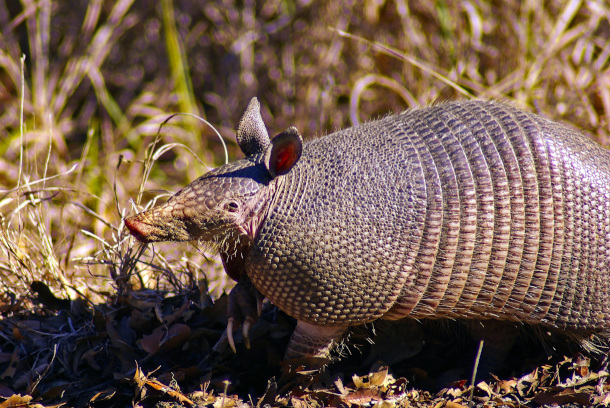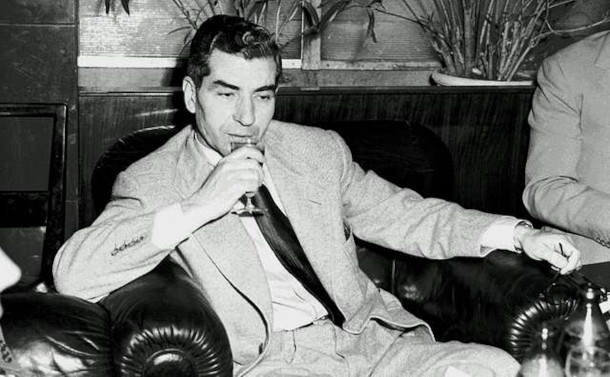Beyond the Headlines
Air Date: Week of March 31, 2023

A group of 140 Scotch distilleries in Scotland have agreed to achieve net zero carbon emissions to maintain a good reputation among tourists and preserve the local peat bogs. (Photo: PublicDomainPictures, Pixabay)
Living on Earth Contributor Peter Dykstra joins Host Bobby Bascomb to talk about Scotch whiskey going green. Also, armadillos are marching north into the Midwest thanks to climate change. And in history, they look back to likely the only time mafia boss Charles “Lucky” Luciano was held accountable for a killing, with the victim a pheasant.
Transcript
CURWOOD: It’s Living on Earth, I’m Steve Curwood.
BASCOMB: And I’m Bobby Bascomb.
Well, it's time for a trip now beyond the headlines. With Living on Earth contributor Peter Dykstra. He's on the line from Atlanta, Georgia. Hey there, Peter, what do you have for us this week?
DYKSTRA: First, we'll go to Scotland, where there are 140 distilleries that have united to try and make whiskey making net zero. They're using a mix of wind energy, possibly tidal energy, and other things to get away from the traditional use of fuels and peat from peat bogs, traditionally burnt in Scotland for warmth and energy. And they're making some progress, but an awful lot to go.
BASCOMB: Well, that's great. But why the sudden interest in green energy there in Scotland?
DYKSTRA: Well, several things. Number one, in recent decades, the people of Scotland have been very environmentally aware. Number two, whiskey is a huge export in the entire United Kingdom. It's one of the biggest dollar-for-dollar food and beverage exports they have. And number three, a lot of these small Scotch distilleries are tourist attractions, and they want to keep goodwill with tourists. It all amounts to something that is enlightened self-interest for the Scots who makes scotch.
BASCOMB: Wow, well, that's a great example of you know, consumer demand driving progress for the environment. What else do you have for us this week?
DYKSTRA: Little story that's been brewing for 20 years on this side of the pond. And armadillos, you either love them or they're just kind of an ugly little nuisance. They started showing up here in Georgia 20 and 30 years ago, and now there are reports of armadillos as far north as Southern Illinois and Southern Indiana. They're moving north due to climate change as things warm up. Armadillos food source is more available, and they're surviving at much higher rates. There was a study done by researchers at Valdosta State University about 10 years ago that projected that with projections of climate change and warming, that someday we will see armadillos as far north as Washington DC on the East Coast and Omaha in the Midwest.

Due to climate change, Armadillos' habitat is expanding further and further north as the warming winters provide them with food year-round. (Photo: MikeGoad, Pixabay)
BASCOMB: Wow. So what kind of impacts might armadillos have in a new ecosystem? You know, further north?
DYKSTRA: Not much they leave quite a stank when they're dead by the side of the road. They don't tend to be disruptive with other ecosystems. They survive on things like grubs and worms.
BASCOMB: You said that they're common roadkill, you know, armadillos, they're sort of like these little well armored tanks. I wonder if they can be dangerous at all as roadkill?
DYKSTRA: Not necessarily dangerous. There no match for a tire, and they just tend to be helpless out there by the side of the road.
BASCOMB: Oh, poor armadillo. Well, I hope they fare better in the north. Well, what do you see for us from the history books this week?
DYKSTRA: March 31st, 1929, big mafia boss Charles Lucky Luciano. He was said to head all of the mafia families in New York. He was successfully prosecuted the only time in his life for killing. And that killing wasn't a mobster or somebody in debt or a rival. It was a pheasant. An Ulster County New York Game Warden fined Lucky Luciano 50 bucks for shooting a pheasant out of season. That pheasant of course sleeps with the fishes. And Lucky went on to do his day-by-day supervision of killing for which he was never put in jail, not for murder.

Gangster Charles “Lucky” Luciano never served time for the human murders he facilitated, but he was caught for one killing: that of a pheasant. (Photo: Remo Nassi, Wikimedia Commons, Public Domain)
BASCOMB: Well, that sort of reminds me of Al Capone that got put away for tax evasion. But of course, I don't suppose anybody's going to see prison time for shooting a pheasant?
DYKSTRA: No. Capone actually ended up doing serious time for that. Lucky Luciano did not. He eventually got caught on some other charges, but not for killing any human being.
BASCOMB: Well, thanks for sharing these stories with us, Peter. Peter Dykstra is a contributor for Living on Earth, and we'll talk to you again real soon.
DYKSTRA: All right, Bobby, thanks a lot. Talk to you soon.
BASCOMB: And there's more on the stories on the Living on Earth website. That's loe.org.
Links
Living on Earth wants to hear from you!
Living on Earth
62 Calef Highway, Suite 212
Lee, NH 03861
Telephone: 617-287-4121
E-mail: comments@loe.org
Newsletter [Click here]
Donate to Living on Earth!
Living on Earth is an independent media program and relies entirely on contributions from listeners and institutions supporting public service. Please donate now to preserve an independent environmental voice.
NewsletterLiving on Earth offers a weekly delivery of the show's rundown to your mailbox. Sign up for our newsletter today!
 Sailors For The Sea: Be the change you want to sea.
Sailors For The Sea: Be the change you want to sea.
 The Grantham Foundation for the Protection of the Environment: Committed to protecting and improving the health of the global environment.
The Grantham Foundation for the Protection of the Environment: Committed to protecting and improving the health of the global environment.
 Contribute to Living on Earth and receive, as our gift to you, an archival print of one of Mark Seth Lender's extraordinary wildlife photographs. Follow the link to see Mark's current collection of photographs.
Contribute to Living on Earth and receive, as our gift to you, an archival print of one of Mark Seth Lender's extraordinary wildlife photographs. Follow the link to see Mark's current collection of photographs.
 Buy a signed copy of Mark Seth Lender's book Smeagull the Seagull & support Living on Earth
Buy a signed copy of Mark Seth Lender's book Smeagull the Seagull & support Living on Earth

